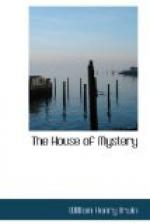“Oh, you’ve been in the Orient—do you know the China Coast—and Nikko and—”
“No, only India.”
“I’ve never been there—and I’ve heard it’s the kernel of the East,” he said with his lips. But his mind was puzzling something out and finding a solution. The accent of that deep, resonant voice was neither Eastern nor Western, Yankee nor Southern—nor yet quite British. It was rather cosmopolitan—he had dimly placed her as a Californienne. Perhaps this fragment explained it. She must be a daughter of the English official class, reared in America. The theory would explain her complexion and her simple, natural balance between frankness and reserve. He formed that conclusion, but, “How do you like America after India?” was all he said.
“How do you like it after the Philippines?” she responded.
“That is a Yankee trick—answering one question with another,” he said, still following his line of conjecture; “it was invented by the original Yankee philosopher, a person named Socrates. I like it after everything—I’m an American. I’m one of those rare birds in the Eastern United States, a native of New York City.”
“Well, then,”—her manner had, for the first time, the brightness which goes with youth, plus the romantic adventure—“I like it not only after anything but before anything—I’m an American, too.”
A sense of irritation rose in him. He had let conjecture grow to conclusion in the most reckless fashion. And why should he care so much that he had risked offending a mere passing acquaintance of the road?
“Somehow, I had taken it for granted—your reference to India I suppose—that you were English.”
“Oh, no! Though an English governess made me fond of the English. I’m another of the rare birds. I was hardly out of New York in my life until five years ago, when my aunt took me for a stay of two years in the Orient—in India at least. I’ve been very happy to be back.”
The current of talk drifted then from the coast of confidences to the open sea of general conversation. He pulled himself up once or twice by the reflection that he was talking too much about himself. Once—and he remembered it with blushes afterward—he went so far as to say, “I didn’t really need to be a doctor, any more than I needed to go to the Philippines—the family income takes care of that. But a man should do something.” Nevertheless, she seemed disposed to encourage him in this course, seemed most to encourage him when he told his stories about the Philippine Army of Occupation.
“Oh, tell me another!” she would cry. And once she said, “If there were a piano here, I venture you’d sing Mandelay.” “That would I,” he answered with a half sigh. And at last, when he was running down, she said, “Oh, please don’t stop! It makes me crazy for the Orient!” “And me!” he confessed. Before luncheon was over, he had dragged out the two or three best stories in his wanderer’s pack,




